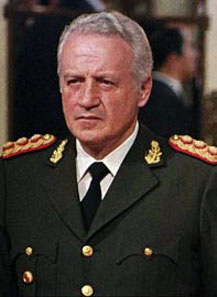Falklands War
undeclared war between Argentina and the United Kingdom in 1982
(Redirected from Diana Gould)
The Falklands War was fought in 1982 between Argentina and the United Kingdom over the Falkland Islands, South Georgia and the South Sandwich Islands. The United Kingdom had held the Falklands since 1831, but in support of a long-standing territorial claim, Argentinian president Leopoldo Galtieri ordered an invasion on 2 April. The British government under Margaret Thatcher dispatched a naval task force which succeeded in taking back control of the islands on 14 June; 649 Argentine and 258 British forces were killed in the war, along with three Falkland Island civilians.


Quotes
edit- The Falklands thing was a fight between two bald men over a comb.
- Jorge Luis Borges, as quoted in Time magazine (14 February 1983)
- Variant: Two bald men fighting over a comb.
- As paraphrased in Julian Barnes, "The worst reported war since the Crimean", The Guardian, 25 February 2002.
- With Christian faith I pray that those who are today our adversaries may understand their error in time and may deeply reflect before persisting in a stance which is rejected by all the free peoples in the world and by all those who had their territory mutiliated and endured colonialism and exploitation.
- Leopoldo Galtieri, President Galtieri’s address to the nation, 2 April 1982
- The Empire Strikes Back.
- Newsweek front page (19 April 1982) in reference to the British Empire.
- The episode of the Falklands war will be seen as important because it convinced many people in and outside the country that we were not played out as a nation... I saw the Falklands invasion as a test of the country's confidence, a test of how the British lion still should behave when somebody really twisted its tail. The great bulk of opinion in the House of Commons reflected opinion in the country. This was a time to stand and, if need be, fight. We should be grateful for that: imagine how this country would feel now if General Galtieri was crowing in Buenos Aires and the Argentinians were still in occupation of the Falklands. What happened was a triumph for a solid British virtue which knows when to say, "Up with this I will not put".
- David Owen, Personally Speaking to Kenneth Harris (1987), pp. 183-184
- What really thrilled me, having spent so much of my lifetime in Parliament, and talking about things like inflation, Social Security benefits, housing problems, environmental problems and so on, is that when it really came to the test, what's thrilled people wasn't those things, what thrilled people was once again being able to serve a great cause, the cause of liberty.
- Margaret Thatcher, Speech to the Scottish Conservative Party Conference, 14 May 1982.
- Often misquoted as: "When you've spent half your political life dealing with humdrum issues like the environment, it's exciting to have a real crisis on your hands."
- The battle of the Falklands was a remarkable military operation, boldly planned, bravely executed, and brilliantly accomplished. We owe an enormous debt to the British forces and to the Merchant Marine. We honour them all. They have been supported by a people united in defence of our way of life and of our sovereign territory.
- Margaret Thatcher, speech in the House of Commons (15 June 1982)
- The significance of the Falklands War was enormous, both for Britain's self-confidence and for our standing in the world...We had come to be seen by both friends and enemies as a nation which lacked the will and the capability to defend its interests in peace, let alone in war. Victory in the Falklands changed that. Everywhere I went after the war, Britain's name meant something more than it had. The war also had real importance in relations between East and West: years later I was told by a Russian general that the Soviets had been firmly convinced that we would not fight for the Falklands, and that if we did fight we would lose. We proved them wrong on both counts, and they did not forget the fact.
- Margaret Thatcher, The Downing Street Years (1993), pp. 173-174
- But when you are at war you cannot allow the difficulties to dominate your thinking: you have to set out with an iron will to overcome them. And anyway what was the alternative? That a common or garden dictator should rule over the Queen's subjects and prevail by fraud and violence? Not while I was prime minister.
- Margaret Thatcher, The Downing Street Years (1993), p. 181
- What an unlikely pair of antagonists! The British have always fought, to be sure. No nation on Earth can be taken seriously in historical circles unless it has had at least one war with the British; it's like not having an American Express card. And yet the very idea of Britain in a contemporary war is a shock. Britain, one feels, fights in history books and not on TV.
- Gene Wolfe, "A Few Points About knife Throwing", Fantasy Newsletter (1983), as reprinted in Gene Wolfe, Castle of Days (1992)
- The Falkland Islands are once more under the government desired by their inhabitants. God save the Queen.
- Jeremy Moore in a telegram informing the British government that the Argentine forces had surrendered, 14 June 1982.
External links
edit- Encyclopedic article on Falklands War on Wikipedia